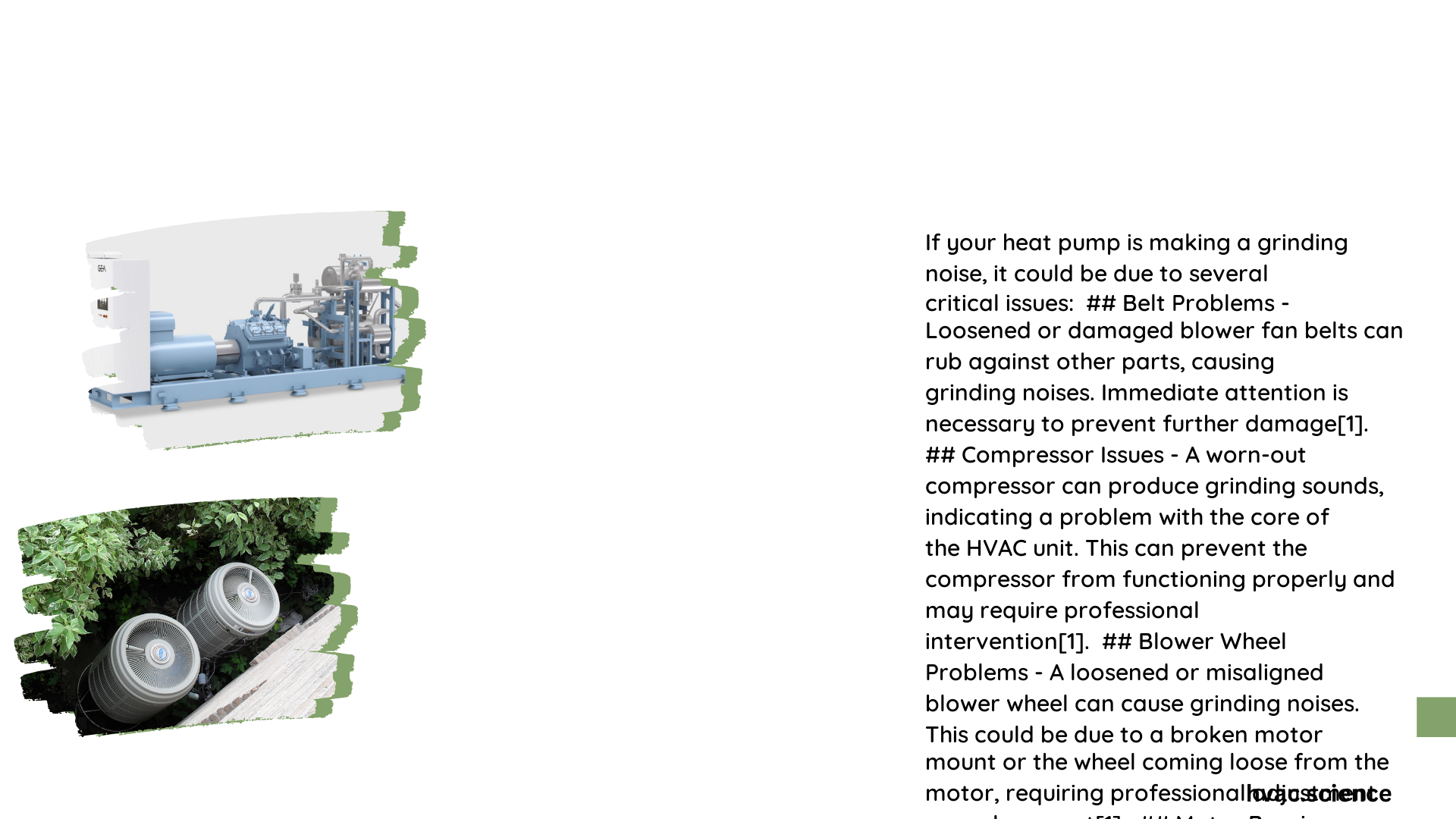A heat pump grinding noise signals potential serious mechanical problems that demand immediate attention. This alarming sound could indicate critical component failures within your heating and cooling system, ranging from compressor wear to fan motor misalignment. Ignoring these sounds might lead to expensive repairs or complete system breakdown, making prompt diagnosis and intervention crucial for maintaining your heat pump’s efficiency and longevity.
What Causes Heat Pump Grinding Noise?
Why Do Compressors Create Grinding Sounds?
Compressor issues are a primary source of grinding noises in heat pumps. When internal components wear down or become misaligned, they generate metallic grinding sounds that indicate significant mechanical stress.
Key Compressor Failure Indicators
- Persistent metallic grinding noise
- Reduced heating/cooling performance
- Increased energy consumption
- Intermittent system cycling
Can Fan Motor Problems Trigger Grinding?
Fan motor complications frequently contribute to grinding noises. Potential issues include:
- Loose Blower Wheel
- Wheel detached from motor shaft
- Rubbing against housing components
-
Potential structural damage
-
Bearing Deterioration
- Worn motor bearings
- Increased friction
- Potential complete motor failure
How Do Belt Issues Produce Grinding Noise?
Damaged or misaligned belts can generate distinctive grinding sounds:
| Belt Problem | Potential Consequences | Repair Complexity |
|---|---|---|
| Excessive Wear | Reduced system efficiency | Low |
| Misalignment | Increased component friction | Medium |
| Complete Breakdown | Total system failure | High |
Diagnostic Strategies for Heat Pump Grinding Noise

What Are Immediate Troubleshooting Steps?
- Immediate System Shutdown
- Prevent further mechanical damage
-
Reduce potential safety risks
-
Visual Component Inspection
- Check blower wheel alignment
- Examine belt condition
- Look for visible mechanical wear
When Should Professional Intervention Occur?
Professional HVAC technicians should be consulted when:
– Grinding noise persists after basic troubleshooting
– Complex component replacement is required
– Specialized diagnostic equipment is needed
Repair and Maintenance Recommendations
What Are Cost-Effective Maintenance Strategies?
- Schedule biannual professional inspections
- Implement regular lubrication protocols
- Replace worn components proactively
- Monitor system performance consistently
How Much Do Repairs Typically Cost?
Repair costs vary based on specific component requirements:
- Compressor Replacement: $1,000 – $3,000
- Blower Wheel Repair: $200 – $500
- Belt Replacement: $50 – $200
Preventative Maintenance Techniques
Can Regular Maintenance Prevent Grinding Noise?
Consistent maintenance significantly reduces the likelihood of grinding noises:
– Clean system components quarterly
– Ensure proper lubrication
– Replace filters regularly
– Monitor system performance
Technical Considerations
What Technical Factors Influence Grinding Noise?
- Mechanical component tolerances
- Refrigerant pressure levels
- Electrical system integrity
- Structural alignment precision
Conclusion
Understanding and addressing heat pump grinding noise requires systematic diagnostic approach, technical knowledge, and proactive maintenance. While some issues can be resolved through basic troubleshooting, complex problems necessitate professional intervention.
Key Takeaways
- Grinding noises indicate potential mechanical failures
- Prompt diagnosis prevents extensive damage
- Professional maintenance is crucial
- Regular inspections minimize repair costs
Reference:
1. Cool Zone Air Conditioning & Heating
2. Cooper Brothers, Inc.
3. Morelli Heating and Air
